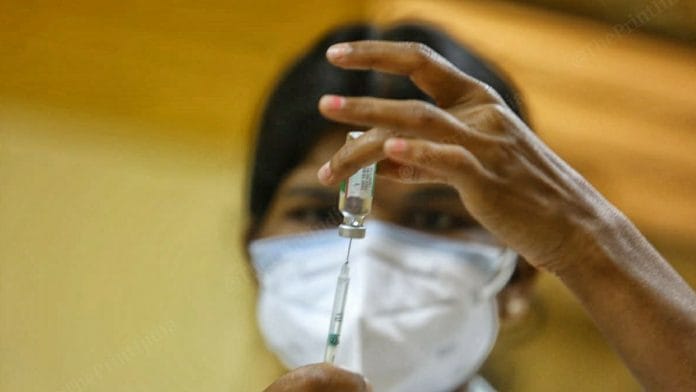New Delhi: Misinformation, lack of government identification cards and poor internet access has made it tougher for India’s trans community to get vaccinated.
As of 17 May, according to health ministry data, 7.53 crore men and 6.75 crore women were vaccinated in the country. In comparison, just 20,269 people, in what the government classifies as the ‘other’ category, got the Covid-19 vaccine. According to the 2011 census, there are 4.87 lakh transgenders in the country.
Activists say that underlying health conditions among members of the community have added to the woes.
“I know several people who have HIV but are not bothered about getting treatment. They are also worried about the symptoms you get after getting the vaccine,” Vanshika Yadav, an outreach worker at the NGO Pehel Foundation in Delhi, told ThePrint.
Her views were seconded by Divya Darshini, who works at Payana, a community-based organisation in Bengaluru. “Many in our community are HIV positive and are immunocompromised, so they are very afraid of going to crowded places and exposing themselves,” Darshini said.
According to Darshini, there is a historical aspect to the situation — the trans community’s distrust of institutions, especially hospitals, is adding to their vaccine hesitation.
“There is also a lot of misinformation going around about what happens after one takes the vaccine. They need counselling on how important it is to get vaccinated,” Darshini said. “Lack of awareness and illiteracy is our greatest concern. We are a marginalised community, the pandemic has only added to an already existing mental stress.”
Also read: ZyCoV-D could be India’s next Covid vaccine: Learn the science behind it & how it’s different
Lack of digital access
There are more factors that compound the problem.
India’s Covid-19 vaccination drive has severely been criticised for creating a digital divide. One can book a slot only via the CoWin app or website — a practice that requires a functioning internet and smartphone, both of which are privileges not often afforded by the trans community.
“Our community does not know how to do online registration,” said Manpreet, a project manager at Pehel. “They don’t know where to go, what to do. Very few people from the trans community have smartphones, so that is another huge issue.”
Adding to their woes is the need for a government ID proof such as an Aadhaar card or a drivers’ licence.
“Most people don’t have any kind of documentation. We aren’t able to provide them with ration also because they don’t have proper ID,” Yadav said.
Ramkali — who is part of Basera Samajik Sansthan, a community organisation focusing on social work in Noida — also believes a lack of IDs is hampering the vaccination drive among the trans community.
“Several members of the trans community either have male or female selected on their ID proofs. Very few people actually have trans IDs, which says they are transgender or ‘other’,” she said. “This could be another reason why the figures seem low.”
The absence of vaccination centres for those living in vulnerable regions is another point of concern. “Most transpeople feel gender dysphoria in public places. Vaccination centres need an atmosphere of safety and acceptance,” Neel, an associate at Ashoka University’s Centre for Studies in Gender and Sexuality, told ThePrint. “The government must partner with nonprofits that work in vulnerable regions to ensure the vaccination drive is wide-spread within the community.”
States take the lead
On 14 May, the Assam government became the first to announce special vaccination centres for the trans community.
“As a marginalised group, they were getting left out of the vaccination process and when we requested the health department, we got a very positive response. They helped with the logistics and we were able to start the vaccination drive without any glitch,” Swati Bidhan Baruah, founder of the All Assam Transgender Association and associate vice-chairperson of Assam government’s transgender welfare board, said.
Soon after, West Bengal announced that it would vaccinated transpeople — among vegetable sellers, hawkers, taxi and auto drivers and sex workers — on priority basis.
However, as India faces a vaccine shortage, running a targeted drive for the trans community is not sustainable. “We are trying to motivate everyone to get their slots booked. We are also helping them with registration since everything is online. Getting the community to follow Covid-appropriate behaviour is very hard because they are illiterate and unaware,” Simran Arora, consultant transgender at the National Backward Classes Finance & Development Corporation, told ThePrint.
(Edited by Arun Prashanth)
Also read: Virus variant in India can infect those vaccinated, but unlikely to cause severe Covid: Study






